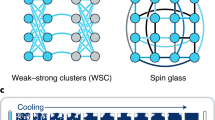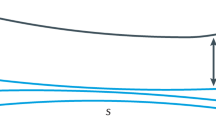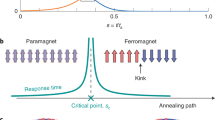Abstract
Quantum annealing is a practical approach to approximately implement the adiabatic quantum computational model in a real-world setting. The goal of an adiabatic algorithm is to prepare the ground state of a problem-encoded Hamiltonian at the end of an annealing path. This is typically achieved by driving the dynamical evolution of a quantum system slowly to enforce adiabaticity. Properly optimized annealing schedules often considerably accelerate the computational process. Inspired by the recent success of deep reinforcement learning such as DeepMind’s AlphaZero, we propose a Monte Carlo tree search (MCTS) algorithm and its enhanced version boosted by neural networks—which we name QuantumZero (QZero)—to automate the design of annealing schedules in a hybrid quantum–classical framework. Both the MCTS and QZero algorithms perform remarkably well in discovering effective annealing schedules even when the annealing time is short for the 3-SAT examples considered in this study. Furthermore, the flexibility of neural networks allows us to apply transfer-learning techniques to boost QZero’s performance. We demonstrate in benchmark studies that MCTS and QZero perform more efficiently than other reinforcement learning algorithms in designing annealing schedules.
This is a preview of subscription content, access via your institution
Access options
Access Nature and 54 other Nature Portfolio journals
Get Nature+, our best-value online-access subscription
$29.99 / 30 days
cancel any time
Subscribe to this journal
Receive 12 digital issues and online access to articles
$119.00 per year
only $9.92 per issue
Buy this article
- Purchase on Springer Link
- Instant access to full article PDF
Prices may be subject to local taxes which are calculated during checkout






Similar content being viewed by others
Data availability
The data that support the results in this paper is available at https://github.com/yutuer21/quantumzero.
Code availability
The code that support the results in this paper is available at https://github.com/yutuer21/quantumzero(ref. 71).
References
Jiang, S., Britt, K. A., McCaskey, A. J., Humble, T. S. & Kais, S. Quantum annealing for prime factorization. Sci. Rep. 8, 17667 (2018).
King, A. D. et al. Observation of topological phenomena in a programmable lattice of 1,800 qubits. Nature 560, 456–460 (2018).
Harris, R. et al. Phase transitions in a programmable quantum spin glass simulator. Science 361, 162–165 (2018).
Willsch, D., Willsch, M., De Raedt, H. & Michielsen, K. Support vector machines on the D-wave quantum annealer. Comput. Phys. Commun. 248, 107006 (2020).
Mott, A., Job, J., Vlimant, Jean-Roch, Lidar, D. & Spiropulu, M. Solving a Higgs optimization problem with quantum annealing for machine learning. Nature 550, 375–379 (2017).
Li, R. Y., Di Felice, R., Rohs, R. & Lidar, D. A. Quantum annealing versus classical machine learning applied to a simplified computational biology problem. npj Quant. Inf. 4, 14 (2018).
Hormozi, L., Brown, E. W., Carleo, G. & Troyer, M. Nonstoquastic Hamiltonians and quantum annealing of an Ising spin glass. Phys. Rev. B 95, 184416 (2017).
Herr, D. et al. Optimizing schedules for quantum annealing. Preprint at https://arxiv.org/abs/1705.00420 (2017).
Zeng, L., Zhang, J. & Sarovar, M. Schedule path optimization for adiabatic quantum computing and optimization. J Phys. A 49, 165305 (2016).
Susa, Y., Yamashiro, Y., Yamamoto, M. & Nishimori, H. Exponential speedup of quantum annealing by inhomogeneous driving of the transverse field. J. Phys. Soc. Jpn 87, 023002 (2018).
Albash, T. & Lidar, D. A. Adiabatic quantum computation. Rev. Mod. Phys. 90, 015002 (2018).
Hauke, P. et al. Perspectives of quantum annealing: Methods and implementations. Rep. Progr. Phys. 83, 054401 (2020).
Farhi, E., Goldstone, J., Gutmann, S. & Sipser, M. Quantum computation by adiabatic evolution. Preprint at https://arxiv.org/abs/quant-ph/0001106 (2000).
Farhi, E. et al. A quantum adiabatic evolution algorithm applied to random instances of an NP-complete problem. Science 292, 472–475 (2001).
Das, A. & Chakrabarti, B. K. Quantum Annealing and Related Optimization Methods (Springer, 2005).
Childs, A. M., Farhi, E. & Preskill, J. Robustness of adiabatic quantum computation. Phys. Rev. A 65, 012322 (2001).
Aharonov, D. et al. Adiabatic quantum computation is equivalent to standard quantum computation. SIAM Rev. 50, 755–787 (2008).
Susa, Y. & Nishimori, H. Variational optimization of the quantum annealing schedule for the Lechner–Hauke–Zoller scheme. Phys. Rev. A 103, 022619 (2021).
Herr, D. et al. Optimizing schedules for quantum annealing. Preprint at https://arxiv.org/abs/1705.00420 (2017).
Schiffer, B. F., Tura, J. & Cirac, J. I. Adiabatic spectroscopy and a variational quantum adiabatic algorithm. Preprint at https://arxiv.org/abs/2103.01226 (2021).
Boixo, S. et al. Eigenpath traversal by phase randomization. Quant. Inf. Comput. 9, 833–855 (2009).
Coulom, R. in Computers and Games 72–83 (Springer, 2007); https://doi.org/10.1007/978-3-540-75538-8_7
Kocsis, L. & Szepesvári, C. Bandit based Monte-Carlo planning. In European Conference on Machine Learning 282–293 (Springer, 2006).
Lee, Chang-Shing et al. The computational intelligence of Mogo revealed in Taiwan’s computer Go tournaments. IEEE Trans. Comput. Intell. AI Games 1, 73–89 (2009).
Silver, D. et al. Mastering the game of go without human knowledge. Nature 550, 354–359 (2017).
Silver, D. et al. A general reinforcement learning algorithm that masters Chess, Shogi, and Go through self-play. Science 362, 1140–1144 (2018).
Peruzzo, A. et al. A variational eigenvalue solver on a photonic quantum processor. Nat. Commun. 5, 4213 (2014).
Kandala, A. et al. Hardware-efficient variational quantum eigensolver for small molecules and quantum magnets. Nature 549, 242–246 (2017).
Farhi, E., Goldstone, J. & Gutmann, S. A quantum approximate optimization algorithm. Preprint at https://arxiv.org/abs/1411.4028 (2014).
McClean, J. R., Romero, J., Babbush, R. & Aspuru-Guzik, A. The theory of variational hybrid quantum–classical algorithms. New. J. Phys. 18, 023023 (2016).
Preskill, J. Quantum computing in the NISQ era and beyond. Quantum 2, 79 (2018).
Cao, Y. et al. Quantum chemistry in the age of quantum computing. Chem. Rev. 119, 10856–10915 (2019).
Chen, M.-C. et al. Demonstration of adiabatic variational quantum computing with a superconducting quantum coprocessor. Phys. Rev. Lett. 125, 180501 (2020).
Dalgaard, M., Motzoi, F., Sørensen, J. J. & Sherson, J. Global optimization of quantum dynamics with AlphaZero deep exploration. npj Quant. Inf. 6, 6 (2020).
Zhang, X.-M., Wei, Z., Asad, R., Yang, X.-C. & Wang, X. When reinforcement learning stands out in quantum control? A comparative study on state preparation. npj Quant. Inf. 5, 85 (2019).
Chen, C., Dong, D., Li, H.-X., Chu, J. & Tarn, T.-J. Fidelity-based probabilistic Q-learning for control of quantum systems. IEEE Trans. Neural Netw. Learn. Syst. 25, 920–933 (2014).
Bukov, M. et al. Reinforcement learning in different phases of quantum control. Phys. Rev. X 8, 031086 (2018).
Niu, M. Y., Boixo, S., Smelyanskiy, V. N. & Neven, H. Universal quantum control through deep reinforcement learning. npj Quant. Inf. 5, 33 (2019).
McKiernan, K. A., Davis, E., Alam, M. S. & Rigetti, C. Automated quantum programming via reinforcement learning for combinatorial optimization. Preprint at https://arxiv.org/abs/1908.08054 (2019).
Khairy, S., Shaydulin, R., Cincio, L., Alexeev, Y. & Balaprakash, P. Reinforcement-learning-based variational quantum circuits optimization for combinatorial problems. Preprint at https://arxiv.org/abs/1911.04574 (2019).
Lin, J., Lai, Z. Y. & Li, X. Quantum adiabatic algorithm design using reinforcement learning. Phys. Rev. A 101, 052327 (2020).
Beloborodov, D. et al. Reinforcement learning enhanced quantum-inspired algorithm for combinatorial optimization. Mach. Learn. Sci. Technol. 2, 025009 (2020).
Ayanzadeh, R., Halem, M. & Finin, T. Reinforcement quantum annealing: a quantum-assisted learning automata approach. Preprint at https://arxiv.org/abs/2001.00234 (2020).
Sutton, R. S. and Barto, A. G. Reinforcement Learning: An Introduction (Bradford, 2018).
Kaelbling, L. P., Littman, M. L. & Moore, A. W. Reinforcement learning: a survey. J. Artif. Intell. Res. 4, 237–285 (1996).
van Otterlo, M. & Wiering, M. in Adaptation, Learning, and Optimization 3–42 (Springer, 2012); https://doi.org/10.1007/978-3-642-27645-3_1
Mnih, V. et al. Playing Atari with deep reinforcement learning. Preprint at https://arxiv.org/abs/1312.5602 (2013).
Mnih, V. et al. Human-level control through deep reinforcement learning. Nature 518, 529–533 (2015).
Schulman, J., Wolski, F., Dhariwal, P., Radford, A. & Klimov, O. Proximal policy optimization algorithms. Preprint at https://arxiv.org/abs/1707.06347 (2017)
Vodopivec, T., Samothrakis, S. & Ster, B. On Monte Carlo tree search and reinforcement learning. J. Artif. Intell. Res. 60, 881–936 (2017).
Nautrup, HendrikPoulsen, Delfosse, N., Dunjko, V., Briegel, H. J. & Friis, N. Optimizing quantum error correction codes with reinforcement learning. Quantum 3, 215 (2019).
Kanno, S. & Tada, T. Many-body calculations for periodic materials via restricted Boltzmann machine-based VQE. Quant. Sci. Technol. 6, 025015 (2021).
Morales, M. E. S., Biamonte, J. & Zimborás, Z. On the universality of the quantum approximate optimization algorithm. Quant. Inf. Process. 19, 291 (2020).
Caneva, T., Calarco, T. & Montangero, S. Chopped random-basis quantum optimization. Phys. Rev. A 84, 022326 (2011).
Fösel, T., Tighineanu, P., Weiss, T. & Marquardt, F. Reinforcement learning with neural networks for quantum feedback. Phys. Rev. X 8, 031084 (2018).
Xu, H. et al. Generalizable control for quantum parameter estimation through reinforcement learning. npj Quant. Inf. 5, 82 (2019).
Wallnöfer, J. et al. Machine learning for long-distance quantum communication. PRX Quant. 1, 010301 (2020).
Karanikolas, V. & Kawabata, S. Improved performance of quantum annealing by a diabatic pulse application. Preprint at https://arxiv.org/abs/1806.08517 (2018).
King, J. et al. Quantum annealing amid local ruggedness and global frustration. J. Phys. Soc. Jpn 88, 061007 (2019).
Hogg, T. Adiabatic quantum computing for random satisfiability problems. Phys. Rev. A 67, 022314 (2003).
Žnidarič, M. Scaling of the running time of the quantum adiabatic algorithm for propositional satisfiability. Phys. Rev. A 71, 062305 (2005).
Kirkpatrick, S. & Selman, B. Critical behavior in the satisfiability of random boolean expressions. Science 264, 1297–1301 (1994).
Monasson, R., Zecchina, R., Kirkpatrick, S., Selman, B. & Troyansky, L. Determining computational complexity from characteristic ‘phase transitions’. Nature 400, 133–137 (1999).
Brockman, G. et al. OpenAI gym. Preprint at https://arxiv.org/abs/1606.01540 (2016).
Dhariwal, P. et al. OpenAI Baselines (GitHub, 2017); https://github.com/openai/baselines
Lloyd, S. Quantum approximate optimization is computationally universal. Preprint at https://arxiv.org/abs/1812.11075 (2018).
Farhi, E., Goldstone, J. & Gutmann, S. Quantum adiabatic evolution algorithms versus simulated annealing. Preprint at https://arxiv.org/abs/quant-ph/0201031 (2002).
Kong, L. & Crosson, E. The performance of the quantum adiabatic algorithm on spike Hamiltonians. Int. J. Quant. Inf. 15, 1750011 (2017).
Roland, J. & Cerf, N. J. Quantum search by local adiabatic evolution. Phys. Rev. A 65, 042308 (2002).
Brady, L. T., Baldwin, C. L., Bapat, A., Kharkov, Y. & Gorshkov, A. V. Optimal protocols in quantum annealing and quantum approximate optimization algorithm problems. Phys. Rev. Lett. 126, 070505 (2021).
Chen, Y. et al. yutuer21/quantumzero: Quantumzero (Zenodo, 2021); https://doi.org/10.5281/zenodo.5749588
Author information
Authors and Affiliations
Contributions
Y.Q.C. performed the simulations and analysed the data. Y.Q.C. and Y.C. wrote the code. All authors contributed to interpreting data and engaged in useful scientific discussions. C.Y.H. conceived and supervised this project. All authors contributed to the writing.
Corresponding author
Ethics declarations
Competing interests
The authors declare no competing interests.
Peer review
Peer review information
Nature Machine Intelligence thanks Evert van Nieuwenburg and the other, anonymous, reviewer(s) for their contribution to the peer review of this work.
Additional information
Publisher’s note Springer Nature remains neutral with regard to jurisdictional claims in published maps and institutional affiliations.
Supplementary information
Supplementary Information
Supplementary Figs. 1–7.
Rights and permissions
Springer Nature or its licensor holds exclusive rights to this article under a publishing agreement with the author(s) or other rightsholder(s); author self-archiving of the accepted manuscript version of this article is solely governed by the terms of such publishing agreement and applicable law.
About this article
Cite this article
Chen, YQ., Chen, Y., Lee, CK. et al. Optimizing quantum annealing schedules with Monte Carlo tree search enhanced with neural networks. Nat Mach Intell 4, 269–278 (2022). https://doi.org/10.1038/s42256-022-00446-y
Received:
Accepted:
Published:
Issue Date:
DOI: https://doi.org/10.1038/s42256-022-00446-y
This article is cited by
-
Beyond games: a systematic review of neural Monte Carlo tree search applications
Applied Intelligence (2024)
-
Quantum confinement detection using a coupled Schrödinger system
Nonlinear Dynamics (2024)
-
Reusability report: Comparing gradient descent and Monte Carlo tree search optimization of quantum annealing schedules
Nature Machine Intelligence (2022)



